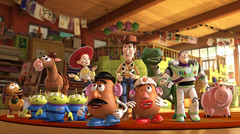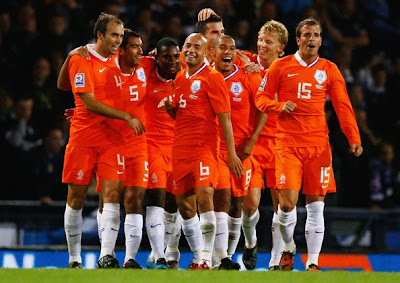|
|
|---|
Wednesday, June 30, 2010
Monday, June 28, 2010
No. 3: Luanda, Angola
Rank in 2009: 1
FOOD:
Lunch at a restaurant: $47
Can of beer from grocer: $1.62
One kg of rice: $4.73
One dozen eggs: $4.75
ENTERTAINMENT:
Movie ticket: $13
APPLIANCES:
Washing machine: $912
Angola’s capital slipped to third place this year as the kwanza depreciated. Prices in Luanda have actually increased in the past year, but currency changes offset any inflation, according to ECA International. In addition to everyday goods, EuroCost International estimates that the average expat pays more than $3,500 per month for a two-bedroom flat in Luanda.
Labels: Angola
Sunday, June 27, 2010
Labels: Lukas Podolski
Saturday, June 26, 2010
Friday, June 25, 2010
What do you get when you throw Billy Wilder and Raymond Chandler on the same film? You get lines like “How could I have known that murder can sometimes smell like honeysuckle?” and one of the most compelling film noirs ever to grace the screen.
Set in Los Angeles, Walter Neff is a niaeve insurance sales man who calls on the wrong house. When he makes his call to the Dietrichson residence to try to talk Mr. Dietrichson into renewing his auto policy he encounters Mrs. Dietrichson and becomes enamored, soon the two create a lovers plot to murder Mr. Dietrichson and scam Walter’s company, by taking out accident insurance and utilizing the double indemnity clause on it, getting paid twice the normal policy amount after Dietrichson’s death. However, murder is no easy game and before long the coconspirators find themselves embroiled in a plot they can’t see an escape from and begin to do anything to keep from ending up in a gas chamber for their crime.
Double Indemnity is one of the finest films Billy Wilder, or anyone in the cast ever made. This film is pitch perfect from the ghostly opening credits to the very end and delivers every twist, turn and foul move with the deft and confidence only a premiere director like Wilder could deliver.
This film speaks to Wilder’s skill because no single major character in this film is remotely sympathetic, and yet you end up caring about their fate. Walter Neff is a good guy gone bad for a dame, a sin he can’t be forgiven for, and from the moment you see Phyllis Dietrichson walk into frame you know that she is Eve’s sin wrapped up with a bow. No one is innocent in this film.
I believe I’ve said it before, but part of where the magic of a Billy Wilder film lies is the timelessness of his stories. Even though this film is set in post-war Los Angles, the script could be taken, set in any major city in a contemporary setting and could work nearly verbatim as a modern picture. Wilder made stories whose plots didn’t revolve on technology, politics or personalities specific to his era; he made stories that were based in universal human emotions – love, greed, lust, wealth and relationships – the rest was incidental.
It’s said by Wilder himself that Chandler had problems adapting to screenplay writing. However, I cannot emphasize enough that the dialogue in this screenplay drips of the tongues of the actors in a way only the writing of Raymond Chandler could. It is lush, fast and complicated forcing the viewer to pay as much attention to the nuances of what the characters are saying as they are to the actions the characters are performing.
Double Indemnity stands high on the list of films I want to aspire to. If I could capture the artistic verve that Wilder & Chandler put into this film, I could put a story on screen that audiences wouldn’t be able to rip their eyes away from. That my friends is a lofty directorial goal.
Director: Billy Wilder
Writers: Billy Wilder & Raymond Chandler
Walter Neff: Fred MacMurray
Phyllis Dietrichson: Barbara Stanwyck
Barton Keyes: Edward G. Robinson
Lola Dietrichson: Jean Heather
Mr. Dietrichson: Tom Powers
Walter Neff: That was all there was to it.Nothing had slipped, nothing had been overlooked.There was nothing to give us away. And yet, Keyes, as I was walking down the street to the drugstore, suddenly, it came over me that everything would go wrong. It sounds crazy Keyes, but it's true, so help me, I couldn't hear my own footsteps. It was the walk of a dead man.
Set in Los Angeles, Walter Neff is a niaeve insurance sales man who calls on the wrong house. When he makes his call to the Dietrichson residence to try to talk Mr. Dietrichson into renewing his auto policy he encounters Mrs. Dietrichson and becomes enamored, soon the two create a lovers plot to murder Mr. Dietrichson and scam Walter’s company, by taking out accident insurance and utilizing the double indemnity clause on it, getting paid twice the normal policy amount after Dietrichson’s death. However, murder is no easy game and before long the coconspirators find themselves embroiled in a plot they can’t see an escape from and begin to do anything to keep from ending up in a gas chamber for their crime.
Double Indemnity is one of the finest films Billy Wilder, or anyone in the cast ever made. This film is pitch perfect from the ghostly opening credits to the very end and delivers every twist, turn and foul move with the deft and confidence only a premiere director like Wilder could deliver.
This film speaks to Wilder’s skill because no single major character in this film is remotely sympathetic, and yet you end up caring about their fate. Walter Neff is a good guy gone bad for a dame, a sin he can’t be forgiven for, and from the moment you see Phyllis Dietrichson walk into frame you know that she is Eve’s sin wrapped up with a bow. No one is innocent in this film.
I believe I’ve said it before, but part of where the magic of a Billy Wilder film lies is the timelessness of his stories. Even though this film is set in post-war Los Angles, the script could be taken, set in any major city in a contemporary setting and could work nearly verbatim as a modern picture. Wilder made stories whose plots didn’t revolve on technology, politics or personalities specific to his era; he made stories that were based in universal human emotions – love, greed, lust, wealth and relationships – the rest was incidental.
It’s said by Wilder himself that Chandler had problems adapting to screenplay writing. However, I cannot emphasize enough that the dialogue in this screenplay drips of the tongues of the actors in a way only the writing of Raymond Chandler could. It is lush, fast and complicated forcing the viewer to pay as much attention to the nuances of what the characters are saying as they are to the actions the characters are performing.
Double Indemnity stands high on the list of films I want to aspire to. If I could capture the artistic verve that Wilder & Chandler put into this film, I could put a story on screen that audiences wouldn’t be able to rip their eyes away from. That my friends is a lofty directorial goal.
Director: Billy Wilder
Writers: Billy Wilder & Raymond Chandler
Walter Neff: Fred MacMurray
Phyllis Dietrichson: Barbara Stanwyck
Barton Keyes: Edward G. Robinson
Lola Dietrichson: Jean Heather
Mr. Dietrichson: Tom Powers
Walter Neff: That was all there was to it.Nothing had slipped, nothing had been overlooked.There was nothing to give us away. And yet, Keyes, as I was walking down the street to the drugstore, suddenly, it came over me that everything would go wrong. It sounds crazy Keyes, but it's true, so help me, I couldn't hear my own footsteps. It was the walk of a dead man.
Thursday, June 24, 2010
Let me start by saying I totally didn’t mean to watch all of (500) Days of Summer again. Really. I didn’t. It’s just that the movie kind of draws you in. You see, I wanted to reference something from the opening of the film, so I popped it in, watched what I needed and started to work on something else while it will still playing and the next thing I knew I was multi-tasking: watching (500) Days of Summer and working. I fully intended to stop the film and put in another movie on my list and suddenly I was more than half-way through the film and you can’t just stop the movie after you’ve invested all that time. You just can’t.
Marc Webb. What have you done to me?
Tom: Did you ever do this, you think back on all the times you've had with someone and you just replay it in your head over and over again and you look for those first signs of trouble?
Marc Webb. What have you done to me?
Tom: Did you ever do this, you think back on all the times you've had with someone and you just replay it in your head over and over again and you look for those first signs of trouble?
Wednesday, June 23, 2010
Uncertainty is a film that I shouldn’t have liked, it’s a film that shouldn’t have worked – but it does. It’s the kind of film a film professor of mine would have yelled at us for trying to make, he would have told us it’s too conceptual, too vague and lacked creativity. I hope he saw this film and ate his words.
The reason this film shouldn’t work & I shouldn’t like it is that it’s one of the most conceptual films I’ve ever seen. The premise of the film is in the name - Uncertainty. This is a film about a young couple, Kate & Bobby, who at the beginning of the film stand on the Brooklyn Bridge debating what to do on their fourth of July holiday. They can’t decide and so they flip a coin. What follows is two distinctly different films merged into one – in one scenario Bobby & Kate stay in the city, find a stray cell phone and end up running for their lives; in the other scenario they go to see Kate’s family and encounter the family dynamic that involves.
After seeing the second season of Project: Greenlight I was not a fan of directing teams, but for Uncertainty the pair of Scott McGehee & David Siegel works beautifully. As there are two completely different stories, the pair each tackles one series of events. The result is two plots that visually exist in the same story but each have a defined color palette, style and signature. It’s visually arresting and fun to watch how the two stories are cut together into one cohesive film, a film that is at once an interesting story on the surface and a metaphor for choices and the internal battle we go through in making them.
I can’t imagine how this was to conquer as actors for Joseph Gordon-Levitt & Lynn Collins. While Kate & Bobby are still the same characters – a young couple struggling with life decisions that will affect their relationships – the stresses each plot puts them under is entirely different. It’s a testament to the actors and directors that what ends up on screen is distinct and blended into a film that ultimately leaves you thinking about the characters future as the credits roll.
I don’t know a lot about the production of this film, so I don’t know if McGehee & Siegel intend to continue working together in the future, but Uncertainty intrigued me enough that it will likely be added to my collection before long and I will definitely see any projects they put out in the future.
Directors & Writers: Scott McGehee & David Siegel
Bobby: Joseph Gordon-Levitt
Kate: Lynn Collins
The reason this film shouldn’t work & I shouldn’t like it is that it’s one of the most conceptual films I’ve ever seen. The premise of the film is in the name - Uncertainty. This is a film about a young couple, Kate & Bobby, who at the beginning of the film stand on the Brooklyn Bridge debating what to do on their fourth of July holiday. They can’t decide and so they flip a coin. What follows is two distinctly different films merged into one – in one scenario Bobby & Kate stay in the city, find a stray cell phone and end up running for their lives; in the other scenario they go to see Kate’s family and encounter the family dynamic that involves.
After seeing the second season of Project: Greenlight I was not a fan of directing teams, but for Uncertainty the pair of Scott McGehee & David Siegel works beautifully. As there are two completely different stories, the pair each tackles one series of events. The result is two plots that visually exist in the same story but each have a defined color palette, style and signature. It’s visually arresting and fun to watch how the two stories are cut together into one cohesive film, a film that is at once an interesting story on the surface and a metaphor for choices and the internal battle we go through in making them.
I can’t imagine how this was to conquer as actors for Joseph Gordon-Levitt & Lynn Collins. While Kate & Bobby are still the same characters – a young couple struggling with life decisions that will affect their relationships – the stresses each plot puts them under is entirely different. It’s a testament to the actors and directors that what ends up on screen is distinct and blended into a film that ultimately leaves you thinking about the characters future as the credits roll.
I don’t know a lot about the production of this film, so I don’t know if McGehee & Siegel intend to continue working together in the future, but Uncertainty intrigued me enough that it will likely be added to my collection before long and I will definitely see any projects they put out in the future.
Directors & Writers: Scott McGehee & David Siegel
Bobby: Joseph Gordon-Levitt
Kate: Lynn Collins
Tuesday, June 22, 2010
As Vanishing Point drew to a close the first thought that struck me is that this movie is Easy Rider with a car. The story of an ex-cop/pro-driver who for no reason is in process of a car delivery and decides to piss off the law and run the police all over the desert, uniting the outcasts of society on his way – it’s counter-culture a few years post it’s death, a death that was shown in Easy Rider.
The character that makes the whole movie work is Super Soul. He’s a DJ out at a desert radio station, and he becomes the unofficial narrator of the piece. He discovers Kowalski’s flight from the police via an illegal scanner and begins to broadcast Kowalski’s progress to all his listeners. Super Soul turns Kowalski into the last heroic soul there is, escaping the law, searching for the last vestiges of freedom in the west and gets the remaining dregs of counter-culture, hidden throughout the desert on Kowalski’s side.
If you’re looking for a deep plot, layers of metaphor and a full-fledged character arch Vanishing Point is probably not the film for you. Easy Rider does a lot more of that than this film. However, Vanishing Point does have its place among films from that influential decade of the 1970’s. This is one of the first macho car films. This is a loving whisper to the faded adventure of the golden west.
What Vanishing Point did for me more than anything is make me want a Dodge Challenger. This car is put through hell and back in Vanishing Point and I swear, by the end of the film the car achieves sex symbol status. Anything that can take a beating like that and keep on ticking is worth driving.
Director: Richard C. Sarafian
Writer: Guillermo Cabrea Infante
Kowalski: Barry Newman
Super Soul: Cleavon Little
Super Soul: And there goes the Challenger, being chased by the blue, blue meanies on wheels. The vicious traffic squad cars are after our lone driver, the last American hero, the electric centaur, the, the demi-god, the super driver of the golden west! Two nasty Nazi cars are close behind the beautiful lone driver. The police numbers are gettin' closer, closer, closer to our soul hero, in his soul mobile, yeah baby! They about to strike. They gonna get him. Smash him. Rape... the last beautiful free soul on this planet.
The character that makes the whole movie work is Super Soul. He’s a DJ out at a desert radio station, and he becomes the unofficial narrator of the piece. He discovers Kowalski’s flight from the police via an illegal scanner and begins to broadcast Kowalski’s progress to all his listeners. Super Soul turns Kowalski into the last heroic soul there is, escaping the law, searching for the last vestiges of freedom in the west and gets the remaining dregs of counter-culture, hidden throughout the desert on Kowalski’s side.
If you’re looking for a deep plot, layers of metaphor and a full-fledged character arch Vanishing Point is probably not the film for you. Easy Rider does a lot more of that than this film. However, Vanishing Point does have its place among films from that influential decade of the 1970’s. This is one of the first macho car films. This is a loving whisper to the faded adventure of the golden west.
What Vanishing Point did for me more than anything is make me want a Dodge Challenger. This car is put through hell and back in Vanishing Point and I swear, by the end of the film the car achieves sex symbol status. Anything that can take a beating like that and keep on ticking is worth driving.
Director: Richard C. Sarafian
Writer: Guillermo Cabrea Infante
Kowalski: Barry Newman
Super Soul: Cleavon Little
Super Soul: And there goes the Challenger, being chased by the blue, blue meanies on wheels. The vicious traffic squad cars are after our lone driver, the last American hero, the electric centaur, the, the demi-god, the super driver of the golden west! Two nasty Nazi cars are close behind the beautiful lone driver. The police numbers are gettin' closer, closer, closer to our soul hero, in his soul mobile, yeah baby! They about to strike. They gonna get him. Smash him. Rape... the last beautiful free soul on this planet.
Labels: barry newman, cleavon little, vanishing point
Monday, June 21, 2010
Women In Trouble is an interesting little film by Sebastian Gutierrez. It’s the interwoven tale of several groups of women having a bad day in the Los Angeles area; porn star Elektra Luxx finds out she’s pregnant and ends up stuck in an elevator during a heat wave with Doris who is struggling with her sister Addy & niece Charlotte; Charlotte is seeing her mother’s shrink and Addy is seeing the shrink’s husband; two prostitutes run into the distraught shrink and help her get drunk to drown her sorrows; meanwhile in the air two flight attendants deal with Nick Chapel – Elektra’s boyfriend & a high profile rock star.
The obvious comparison here is to Perdo Almodovar’s Women on the Verge of a Nervous Breakdown, but I don’t think this was Gutierrez’s full intention –his film may be more homage than American remake. While the cast of distraught female characters is there, and a bit of a quirky artistic flare, I do think that Gutierrez was trying to make a artistic statement about a day in the lives of these women in a difficult environment.
I’ve read a few reviews that based Women In Trouble for being a horrible depiction of women – hookers, porn stars, victims & dumb blondes. While I do agree that these women are all an extreme I didn’t find this offensive and I am a woman. To serve this film justice the characters in this film needed to be pretty extreme – otherwise it would have to be a serious drama like Far From Heaven or Revolutionary Road instead of being quirkily upbeat. Besides, if you’ve spent any time at all in LA – you’ve seen plenty of women like all of these women – even the naive shrink and too world-wise child.
All in all I enjoyed the quirky pace of this film. I’ll probably check out the sequel Elektra Luxx when it makes it’s way to me. Gutierrez painted a unique enough world that I would not mind visiting it again and finding out what happened to Elektra after the credits rolled.
Director & Writer: Sebastian Gutierrez
Elektra Luxx: Carla Gugino
Holly Rocket: Adrianne Palicki
Doris: Connie Britton
Addy: Caitlin Keats
Charlotte: Isabella Gutierrez
Travis McPherson: Simon Baker
Maxine McPherson: Sarah Clarke
Bambi: Emmanuelle Chriqui
Cora: Marley Shelton
Nick Chapel: Josh Brolin
Bert Rodriguez: Joseph Gordon-Levitt
The obvious comparison here is to Perdo Almodovar’s Women on the Verge of a Nervous Breakdown, but I don’t think this was Gutierrez’s full intention –his film may be more homage than American remake. While the cast of distraught female characters is there, and a bit of a quirky artistic flare, I do think that Gutierrez was trying to make a artistic statement about a day in the lives of these women in a difficult environment.
I’ve read a few reviews that based Women In Trouble for being a horrible depiction of women – hookers, porn stars, victims & dumb blondes. While I do agree that these women are all an extreme I didn’t find this offensive and I am a woman. To serve this film justice the characters in this film needed to be pretty extreme – otherwise it would have to be a serious drama like Far From Heaven or Revolutionary Road instead of being quirkily upbeat. Besides, if you’ve spent any time at all in LA – you’ve seen plenty of women like all of these women – even the naive shrink and too world-wise child.
All in all I enjoyed the quirky pace of this film. I’ll probably check out the sequel Elektra Luxx when it makes it’s way to me. Gutierrez painted a unique enough world that I would not mind visiting it again and finding out what happened to Elektra after the credits rolled.
Director & Writer: Sebastian Gutierrez
Elektra Luxx: Carla Gugino
Holly Rocket: Adrianne Palicki
Doris: Connie Britton
Addy: Caitlin Keats
Charlotte: Isabella Gutierrez
Travis McPherson: Simon Baker
Maxine McPherson: Sarah Clarke
Bambi: Emmanuelle Chriqui
Cora: Marley Shelton
Nick Chapel: Josh Brolin
Bert Rodriguez: Joseph Gordon-Levitt
As an adult I feel a bit silly saying that Toy Story 3 made me cry, but as a fan of the films since I was a child it’s completely understandable why Pixar would be able to tap into my emotions and use a product and characters I had grown up with in a poignant way.
This adventure for Andy’s toys revolves around the fact that Andy is no longer a child, he’s going off to college in a week and though Buzz, Woody and most of his childhood toys are still around they don’t know what their fate will be. When Andy’s Mom accidently donates the toys instead of storing them in the attic they assume Andy wanted to throw them out and refuse to follow Woody home in time to see Andy leave. Buzz, Sally & the rest end up trapped at the Sunny Side Day care Center under the eye of Lotso – a toy bear who rules the day care with an iron fist.
What I appreciate about the Toy Story series as an adult is that each film is a metaphor for a stage of life. The first film was about accepting a new member of your family, the second about a midlife crisis, and the third installment is about aging – they’re a beautiful message about family and love. I could write pages about the layer of meaning and metaphor in the films, and I do believe Pixar is able to pack so much meaning, fun and emotion into every film simply because of the way they make their films – doing draft after draft of visual and story before the final animation process ever begins.
While Toy Story 3 didn’t make me emotional the same way the story of Ellie & Carl did in Up there were two definite moments in the film that got me. The first was near the beginning when Woody and the toys discuss their missing friends; Woody claims they’ve gone on to new homes at garage sales, but any viewer who’s paid attention knows they are actually characters whose voice actor has died. The second emotional moment, that did make me tear up, occurs in the last scene of the film. I won’t discuss it here as it would be a spoiler but it has to do with Andy not being a kid any more.
I still can’t believe that I’ve literally grown up with Toy Story. It seems like just a few years ago I was a kid going with my brothers to see the first movie, but here I am now, a young director trying to make movies that impact others they way movies like Toy Story have impacted me.
Director: Lee Unkrich
Writers: Michael Arndt, John Lasseter, Andrew Stanton & Lee Unkrich
Woody: Tom Hanks
Buzz Lightyear: Tim Allen
Jessie: Joan Cusack
Lotso: Ned Beatty
Mr. Potato Head: Don Rickles
Ken: Michael Keaton
Rex: Wallace Shawn
Hamm: John Ratzenberger
Mrs. Potato Head: Estelle Harris
Andy: John Morris
Barbie: Jodi Benson
Bonnie: Emily Hahn
Andy’s Mom: Laurie Metcalf
Sergeant: We've done our duty. Andy's grown up.
Soldier: Let's face it. When the trash bags come out, we army guys are the first to go.
Buzz Lightyear: Trash bags?
Woody: Who said anything about trash bags?
Sergeant: It has been an honor serving with you. Good luck, folks.
This adventure for Andy’s toys revolves around the fact that Andy is no longer a child, he’s going off to college in a week and though Buzz, Woody and most of his childhood toys are still around they don’t know what their fate will be. When Andy’s Mom accidently donates the toys instead of storing them in the attic they assume Andy wanted to throw them out and refuse to follow Woody home in time to see Andy leave. Buzz, Sally & the rest end up trapped at the Sunny Side Day care Center under the eye of Lotso – a toy bear who rules the day care with an iron fist.
What I appreciate about the Toy Story series as an adult is that each film is a metaphor for a stage of life. The first film was about accepting a new member of your family, the second about a midlife crisis, and the third installment is about aging – they’re a beautiful message about family and love. I could write pages about the layer of meaning and metaphor in the films, and I do believe Pixar is able to pack so much meaning, fun and emotion into every film simply because of the way they make their films – doing draft after draft of visual and story before the final animation process ever begins.
While Toy Story 3 didn’t make me emotional the same way the story of Ellie & Carl did in Up there were two definite moments in the film that got me. The first was near the beginning when Woody and the toys discuss their missing friends; Woody claims they’ve gone on to new homes at garage sales, but any viewer who’s paid attention knows they are actually characters whose voice actor has died. The second emotional moment, that did make me tear up, occurs in the last scene of the film. I won’t discuss it here as it would be a spoiler but it has to do with Andy not being a kid any more.
I still can’t believe that I’ve literally grown up with Toy Story. It seems like just a few years ago I was a kid going with my brothers to see the first movie, but here I am now, a young director trying to make movies that impact others they way movies like Toy Story have impacted me.
Director: Lee Unkrich
Writers: Michael Arndt, John Lasseter, Andrew Stanton & Lee Unkrich
Woody: Tom Hanks
Buzz Lightyear: Tim Allen
Jessie: Joan Cusack
Lotso: Ned Beatty
Mr. Potato Head: Don Rickles
Ken: Michael Keaton
Rex: Wallace Shawn
Hamm: John Ratzenberger
Mrs. Potato Head: Estelle Harris
Andy: John Morris
Barbie: Jodi Benson
Bonnie: Emily Hahn
Andy’s Mom: Laurie Metcalf
Sergeant: We've done our duty. Andy's grown up.
Soldier: Let's face it. When the trash bags come out, we army guys are the first to go.
Buzz Lightyear: Trash bags?
Woody: Who said anything about trash bags?
Sergeant: It has been an honor serving with you. Good luck, folks.
Saturday, June 19, 2010
Labels: Robinho World Cup 2010
Labels: Netherlands Football Team
Friday, June 18, 2010
I clearly remember the day in 2006 when my brother and I decided to see Brick. We didn’t know a lot about the film, except it was a detective film, was a hit at Sundance, and starred the kid from 3rd Rock from the Sun. This was why I was taken a bit back when I purchased my ticket and was handed a small Brick thesaurus. Needless to say, I was intrigued and frightened. What unfolded for me over the next two hours is still one of the single most inspiring films I’ve ever seen.
Set in a non-descript California high school, Brick is the tale of a young man, Brendan who answers the plea for help from his ex-girlfriend Emily. When he finds Emily’s body, Brendan is wracked with guilt because he did not act fast enough and decides to start shaking things up. As Brendan investigates the last few months of Emily’s life he unearths the shady underbelly of his city that he’s avoided and gets wrapped up with the Pin a local drug dealer, his main muscle Tug, and Laura who may or may not be on his side. As Brendan works through the mysteries surrounding Emily he gets pulled deeper into a void that he tries to keep from spiraling out of control and consuming him the way it consumed Emily.
If you haven’t experienced Brick yet, I cannot urge you enough to find it. This film is Rian Johnson’s feature directorial debut, and let me tell you it has rocketed him to the top of my list of director’s to watch. Brick was made for next to nothing in terms of budgets, but Johnson used every resource available to him, filled the cast with young but impeccable talent, and filled the screen with compelling visuals and uses writing and dialogue the way a painter uses oils. It’s a beautiful thing.
Brick works so well because it’s a hard boiled film noir that chooses not to worry about paying homage to its roots. When the story already has drugs, crime, a femme fatale and an anti-hero there’s enough going on that Johnson knew directly referencing any noir would be like hitting the nail on the head – too hard. Instead you are ushered into an odd setting for a noir, a contemporary high school and given all of the pieces of the puzzle as Brendan is given them and the journey is what drives the homage and the viewing experience.
I can’t get out of talking about Brick without showering some praise on the man that brings Brendan to life – Joseph Gordon-Levitt. Brendan is the role that landed Gordon-Levitt on the map of young actors to watch and provided a solid foundation for the years that have passed since; though he is young Gordon-Levitt doesn’t have to worry about a pay check and instead has chosen to appear in films that he selects based on content – this has kept him out of the trap of making work just to eat. In this, as with most of his films, Gordon-Levitt disappears into the role and what makes the skill involved here most believable is that the complex dialogue rolls off his tongue as if it were second nature. This is quite a feat on a film as unique as Brick.
I’ll finish up by saying it again, find this movie. Sooner rather than later. Maybe like me you’ll want to drive down to San Clemente and explore the sights you recognize from the movie too.
Director & Writer: Rian Johnson
Brendan: Joseph Gordon-Levitt
Laura: Nora Zehtner
The Pin: Lukas Has
Tug: Noah Fleiss
The Brain: Matt O’Leary
Emily: Emilie de Ravin
Dode: Noah Segan
Kara: Megan Goode
Brendan: Throw one at me if you want, hash head. I've got all five senses and I slept
last night, that puts me six up on the lot of you.
Set in a non-descript California high school, Brick is the tale of a young man, Brendan who answers the plea for help from his ex-girlfriend Emily. When he finds Emily’s body, Brendan is wracked with guilt because he did not act fast enough and decides to start shaking things up. As Brendan investigates the last few months of Emily’s life he unearths the shady underbelly of his city that he’s avoided and gets wrapped up with the Pin a local drug dealer, his main muscle Tug, and Laura who may or may not be on his side. As Brendan works through the mysteries surrounding Emily he gets pulled deeper into a void that he tries to keep from spiraling out of control and consuming him the way it consumed Emily.
If you haven’t experienced Brick yet, I cannot urge you enough to find it. This film is Rian Johnson’s feature directorial debut, and let me tell you it has rocketed him to the top of my list of director’s to watch. Brick was made for next to nothing in terms of budgets, but Johnson used every resource available to him, filled the cast with young but impeccable talent, and filled the screen with compelling visuals and uses writing and dialogue the way a painter uses oils. It’s a beautiful thing.
Brick works so well because it’s a hard boiled film noir that chooses not to worry about paying homage to its roots. When the story already has drugs, crime, a femme fatale and an anti-hero there’s enough going on that Johnson knew directly referencing any noir would be like hitting the nail on the head – too hard. Instead you are ushered into an odd setting for a noir, a contemporary high school and given all of the pieces of the puzzle as Brendan is given them and the journey is what drives the homage and the viewing experience.
I can’t get out of talking about Brick without showering some praise on the man that brings Brendan to life – Joseph Gordon-Levitt. Brendan is the role that landed Gordon-Levitt on the map of young actors to watch and provided a solid foundation for the years that have passed since; though he is young Gordon-Levitt doesn’t have to worry about a pay check and instead has chosen to appear in films that he selects based on content – this has kept him out of the trap of making work just to eat. In this, as with most of his films, Gordon-Levitt disappears into the role and what makes the skill involved here most believable is that the complex dialogue rolls off his tongue as if it were second nature. This is quite a feat on a film as unique as Brick.
I’ll finish up by saying it again, find this movie. Sooner rather than later. Maybe like me you’ll want to drive down to San Clemente and explore the sights you recognize from the movie too.
Director & Writer: Rian Johnson
Brendan: Joseph Gordon-Levitt
Laura: Nora Zehtner
The Pin: Lukas Has
Tug: Noah Fleiss
The Brain: Matt O’Leary
Emily: Emilie de Ravin
Dode: Noah Segan
Kara: Megan Goode
Brendan: Throw one at me if you want, hash head. I've got all five senses and I slept
last night, that puts me six up on the lot of you.
Labels: Gonzalo Higuain
Thursday, June 17, 2010
Subscribe to:
Comments (Atom)






































































